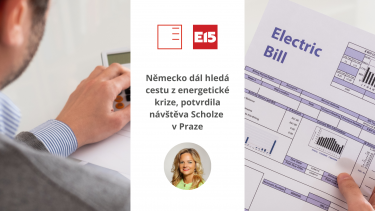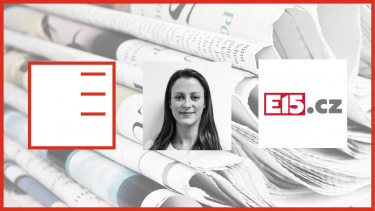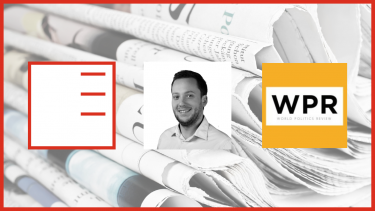E15: Germany continues to look for a way out of the energy crisis, confirms Scholz's visit to Prague
Tereza Novotná, an associate research fellow at our Institute, has provided a commentary for the E15 portal. In the article, she discusses the visit of German Chancellor Olaf Scholz to Prague and the energy crisis that threatens the EU. According to Novotná, responsibility also lies with other countries, including the Czech Republic, which also failed to develop other energy sources in time.
Show more
E15 | The Germans are preparing for a harsh winter. But the core will only be at the mercy of a temporary
Our research fellow Michal Hrubý commented for the news server E15.cz on the German government's preparations for energy shortages during the coming winter. He also comments on Germany's temporary return to nuclear power.
Show moreRTVS: Some EU countries are returning to coal energy
The return of coal as a source of electricity production is a direct consequence of the Russian aggression in Ukraine. The resumption of coal-fired power stations in Europe means an increase in harmful emissions, jeopardizing the EU's climate targets. EUROPEUM Institute researcher Kateřina Davidová spoke in detail about the energy crisis in Europe, the measures that Brussels is taking to prevent countries from turning to sources of electricity such as coal, and the compensatory measures taken by member states.
Show more
E15.cz: Rescuing Uniper will cost Germany as much as two gigafactories. But experts say it is necessary
German energy giant Uniper is teetering on the brink of bankruptcy and there is not much time left to save it. A key moment is due this Thursday, when it will become clear whether or not Moscow will resume suspended gas supplies to Germany. Our researcher Michal Hrubý commented on this situation for E15.cz.
Show moreEU MONITOR: Recharging the Czech EU Presidency
Czechia will enter its second round of the EU Presidency on the 1st of July. Despite the ongoing major shift toward e-mobility across the EU, no strong commitments are coming from the Czech government. The widely accepted milestone of 2035 for phasing-out the sales of new non-zero-emission cars is still perceived by many local policy-makers as unrealistic. Michal Hrubý, a research fellow at the Institute for European Policy, writes in his EU Monitor.
Show more PDF
E15: Candidate status is just a gesture. Ukraine will join the European Union decades from now
Senior Research Fellow Jana Juzová commented for E15.cz on the topic of Ukraine's EU membership. The launch of the accession process was supported by the European Commission, but also by some EU member states - for example, Germany, France, Italy and, of course, the Czech Republic.
Show moreINVITATION: Reunification of Germany from the Czech perspective - public conference in Liberec
We would like to invite you to the debates within the rEUnify project, which will take place on Friday 3 June at the Technical University in Liberec. The event is organised by EUROPEUM Institute for European Policy and the Technical University of Liberec.
Show more
Navigating the Indo-Pacific: Dealing with Geopolitical and Security Shifts in the Region
We would like to invite you to the in person debate called "Navigating the Indo-Pacific: Dealing with Geopolitical and Security Shifts in the Region" which will be held at EUROPEUM Institute for European Policy, Staroměstké náměstí 4/1, Prague (Room "Minuta") on Friday, March 18 at 15:00.
Show more
Report: EU – Pacific Talks: H2 – Hydrogen Hype
David Plhák wrote a report from the EU - Pacific Talks debate on: H2 - Hydrogen Hype. The debate outlined the current state of the hydrogen economy and its role in the EU, Czech Republic and Japan's efforts to achieve climate neutrality and reduce energy dependence on hydrogen.
Show more PDFWorld Politics Review: Germany’s New Government Could Spell Trouble for the Visegrad Four
The director of our Brussel's office, Žiga Faktor, gave a commentary to World Politics Review on their new article Germany's New Government Could Spell Trouble for the Visegrad Four. The New German Government had been getting positive reviews even before it took office in early December. But not everyone is pleased with the new coalition government, one of which is Viktor Orban.
Show more
Staroměstské náměstí 4/1
Prague 1 - Staré Město
110 00
tel.: +420 212 246 552
email: europeum@europeum.org
https://www.europeum.org









